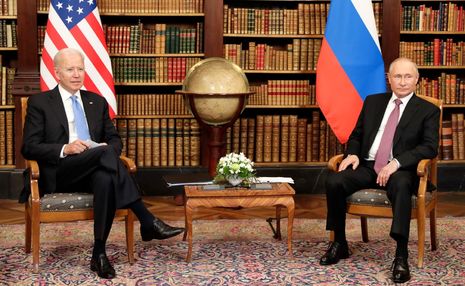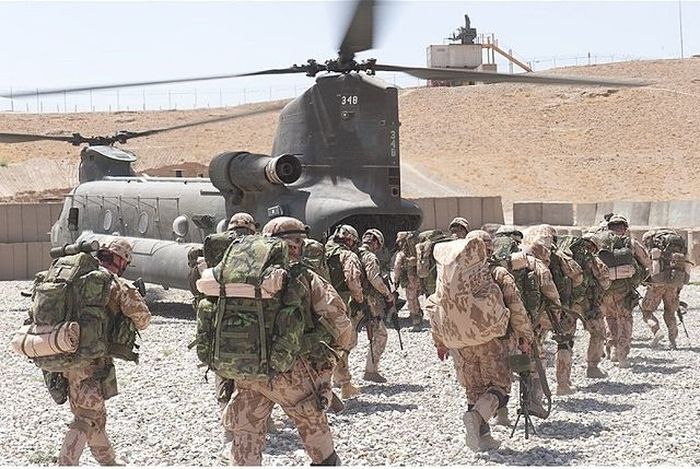War or peace? Understanding Russia’s real motivations in Ukraine
Following talks between Biden and Putin, Medhansh Kumar analyses the reasons behind Russia’s troop mobilisation at the Ukrainian border

The amassing of Russian troops along the Ukrainian frontier in the final days of 2021 have proven worrying for the USA and its allies, to say nothing of Kyiv. President Biden and his Russian counterpart have already engaged over the phone, and high-level talks are due to commence shortly.
As is predictable whenever the US and Russia lock horns, speculations pour out of every corner. Some argue that this latest development is yet another of President Putin’s attempts to muster domestic credibility in the face of accusations of corruption and a weak economy. Others credit the Russian threat of invasion as an exercise in brinkmanship — an attempt to extract concessions from a weary West with a limited appetite for doing much beyond imposing sanctions by threatening escalation, without any intention to actually go to war. There’s also the perennial image of Putin-as-a-1980s-modern-rock-artist — the idea that the Russian President wants to resurrect the dominant role the USSR once played, or related ideas of Russia wishing to reassert some form of geopolitical relevance. Putin himself seems to paint a picture of historic unity and of a Western anti-Russia movement. All of these analyses, though virtuous on their own merits, fail to consider that, irrespective of the American response, Russia is likely to score some diplomatic points.
“Russia’s red line, which the US has rejected out of hand, is that Ukraine should not be allowed to join NATO”
But first, let’s stop the tanks from cluttering up our view of the crisis. There is strong academic support for the idea that Russia might just be ready to go to war over this issue, on the basis that Russia has shown a proclivity towards disregarding the territorial integrity and independent, sovereign status of her neighbours in recent years. However, Russia requires a relatively calm frontier at this time. While Russia hasn’t been economically devastated by the pandemic, its recovery remains dependent on state intervention and government spending in the economy and on welfare — not on foreign wars. Moreover, the country’s natural gas industry is dependent on European markets, just as those markets depend on it, and unseating those relationships will further trouble the state. Finally, the population no longer skews towards the young, able-bodied and fighting fit. The economic and demographic costs are much too high for Russia to consider a full-fledged state of war.
I argue that understanding the real motivation behind these military movements requires us to listen to what Russian diplomats and the Russian state have really been saying: Russia’s red line, which the US has rejected out of hand, is that Ukraine should not be allowed to join NATO. The really important word in that sentence isn’t a word at all — it’s an acronym. The motivation behind Russia’s troop movements, and indeed, in the talks, is not concessions in Ukraine, or on sanctions (though the Kremlin would hardly turn its nose up at those), but rather weakening NATO and the West as a cohesive bloc more generally.
“European leaders are already less than happy about the lack of invites to the January 10th discussions on Ukraine”
If the USA takes a hard-nosed stance in the upcoming talks, refusing to make any concessions to Russia and engaging in rhetorical flourishes, a number of its European allies will be less than glad. After all, many have strong economic ties with Russia and would like to see a softer, though not soft, approach. European leaders are already less than happy about the lack of invites to the January 10th discussions on Ukraine. The danger is that EU-US ties, and particularly US-Germany relations might be strained by what each partner sees as insufficient regard for European interests, or a naive, kid-gloved approach to Putin.
On the other hand, should the USA take a more conciliatory stand, there is little doubt that the Biden administration will be skewered by the national and international press. More broadly, with troubles in Afghanistan and with Manchin putting the reform agenda pushed by Biden into jeopardy, a perceived failure in Ukraine could be the straw that breaks Biden’s back. In Russia’s best case scenario, this could trigger rising support for the Republican Party, and see a Trump ideologue back in the White House. Such a scenario would justifiably cause anxiety and tensions within Europe, given Trump’s affections towards Russia and coolness vis-a-vis NATO. Therefore, irrespective of whether the US reacts sternly, Russia now has the power to make America and its allies seem weaker and more disunited as a bloc.
With Number 10 embroiled in a political thunderstorm, Schloz in Germany having to fill Angela Merkel’s shoes and Biden facing challenges from all sides, perhaps the current mobilisation is aimed more broadly at weakening the West. A more comprehensive reification of goals, instead of analyses that are constrained by focusing just on the Ukrainian dimension of Putin’s moves, would be a far more insightful approach to the current crisis.
 News / Colleges charge different rents for the same Castle Street accommodation2 March 2026
News / Colleges charge different rents for the same Castle Street accommodation2 March 2026 News / King’s hosts open iftar for Ramadan3 March 2026
News / King’s hosts open iftar for Ramadan3 March 2026 Theatre / Lunatics and leisure centres 4 March 2026
Theatre / Lunatics and leisure centres 4 March 2026 News / Angela Merkel among Cambridge honorary degree nominees27 February 2026
News / Angela Merkel among Cambridge honorary degree nominees27 February 2026 News / News in Brief: waterworks, wine woes, and workplace wins 1 March 2026
News / News in Brief: waterworks, wine woes, and workplace wins 1 March 2026








